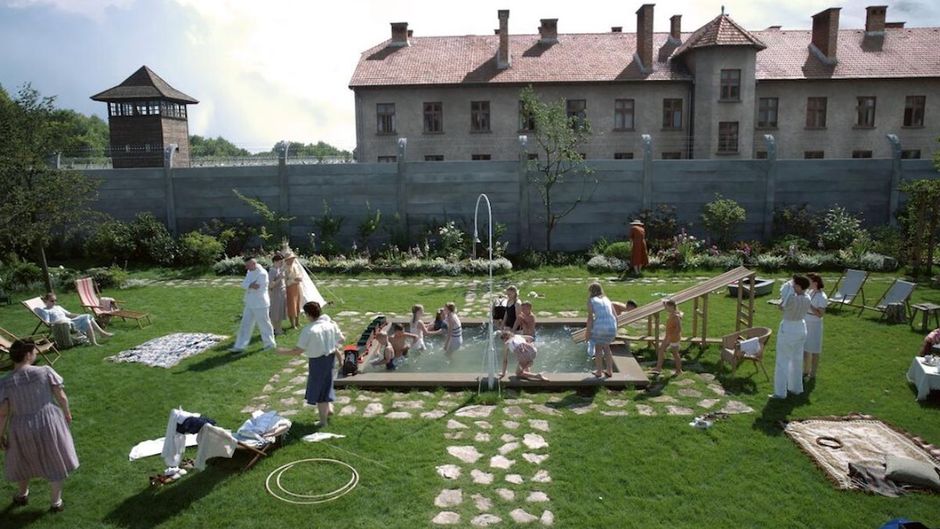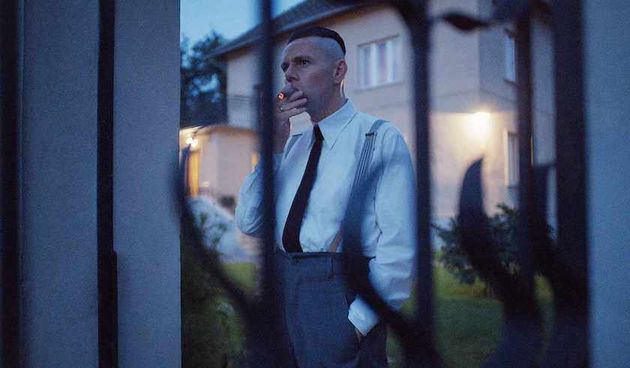When we assess evil, we always take the position of the judge who observes what is happening. Our problem is that our criteria are always flawed.
 Image from the film showing the courtyard of the Hoss house next to the Auschwitz wall / Screenshot of the film, Filmin.
Image from the film showing the courtyard of the Hoss house next to the Auschwitz wall / Screenshot of the film, Filmin.
Jonathan Glazer has won the Best International Feature Film award at the last Oscars with The Zone of Interest, a film that stirs emotions.
It is the story of the Hoss family in their house adjacent to the Auschwitz concentration and extermination camp, where Rudolf Hoss was commandant between 1940 and 1945.
With an outstanding performance of the Hoss couple by Christian Friedel and Sandra Hüller, who already stood out at the same Oscars with Anatomy of a Fall, Glazer's film (another good production by A24, which has lately presented big screen pearls such as Past Lives), leads the spectator to a subject as complex as the trivialisation of the evil and pain of others.
There have been many films about Nazism and the Second World War, but his approach rejects the obsession with violence or the caricaturing of Germans as mere savage beasts.
Glazer tries to dig into the depths of the soul and how anyone can live with such a horror as Auschwitz without questioning what is going on.
The problem that Glazer brings to the screen has to do with that very random way of valuing evil that we have as a civilisation.
In a time when the idea of objective, universal truth is rejected and relativism takes on a strong emphasis in the way we order life, many things that are not really right, become right.
If almost everything is right, then almost nothing can be wrong. This undermines our ability to evaluate and judge evil.
Moreover, we generally see the evil and pain of others as mere witnesses who no longer know how to react, protest and what to do about it.
The society of relativism is also the society of individualism, and what prevails is self-defence.
In fact, many political discourses are presented like that: weapons to defend oneself, walls to defend ourselves from something that is out there, borders to preserve ourselves, etc.
When we assess evil, we always take the position of the judge who observes what is happening in front of him. Our problem is that our criteria are always flawed.
The Bible tells us of a 'clash of righteousnesses': ours, which comes from flawed motivations and therefore its application and purpose are flawed; and God's, which is the true justice, the one that is above and is to judge our supposed '(in)righteousnesses': "To deny people their rights before the Most High [...] the Lord does not approve" (Lamentations 3:35-36).
Observing the evil of others continues to provoke all kinds of reactions in us, depending on many factors. Sometimes it tears us apart, others it leaves us indifferent.
Through the story of the Hosses, who are more concerned about the condition of their greenhouse than about the thousands and thousands of lives on the other side of the wall, Glazer tries to show that trivialisation of the evil of others.
“Heartlessness and amnesia seem to go together”,says Susan Sontag, meditating on the role of memory in acknowledging the pain of others, in her essay Regarding The Pain Of Others.
However, she adds: “But history gives contradictory signals about the value of remembering in the much longer span of a collective history. To reconcile, it is necessary that memory be faulty and limited”.

Evil has an aspect that we all find cosmic, it encompasses what we can hardly comprehend.
How is it possible that six million people were executed while thousands of others, just a few kilometres away from those places, enjoyed their homes with swimming pools, greenhouses and swings?
There is something about evil that really tears us apart, even though we enjoy seeing images of war in the news and films. It is the morbidity of what deep down makes us uncomfortable.
Glatzer brilliantly captures that idea in his film with the image of Hoss smoking a cigarette under a starry sky and in front of the wall separating his property from the Auschwitz camp, while the smoke column of another arriving train loaded with Jews rises over the wall.
Or with the grotesquely childish character of Mrs Hoss, who says she wants to see her children grow up in a place and a house where she feels at ease.
Sontag was right: if there were not some moments in which memory, not so much disappears as adapts to the present and modulates its intensity, it would be impossible to reconcile such atrocities.
And the truth is that, in many cases, we have not been able to do so, because to experience reconciliation we must first acknowledge our inability to experience something so complex with such fullness, being ourselves those impassive witnesses to the evil and pain of others.
Luckily, God has not remained idle in the face of such a scenario. Rather, He Himself has taken the initiative to bring about that reconciliation, taking upon Himself our condemnation on the cross and rising victorious.
There is only one way to survive the complexity of evil in which we dwell, which surrounds us and which we are, and that is to experience the forgiveness that by grace has been offered to us in Christ for reconciliation with God.
Jonatan Soriano, journalist in Barcelona, Spain.
[analysis]
[title]One more year[/title]
[photo][/photo]
[text]At Evangelical Focus, we have a sustainability challenge ahead. We invite you to join those across Europe and beyond who are committed with our mission. Together, we will ensure the continuity of Evangelical Focus and Protestante Digital (Spanish) in 2024.
Learn all about our #OneMoreYearEF campaign here (English).
[/text][/analysis]

Las opiniones vertidas por nuestros colaboradores se realizan a nivel personal, pudiendo coincidir o no con la postura de la dirección de Protestante Digital.
Si quieres comentar o